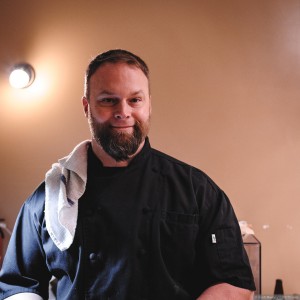Photo: Paul Smith’s College students working a buffet line. Photo Credit: Paul Smith’s College Archives
It’s commonly accepted that the majority of kitchen jobs in the restaurant industry are low paying. With the exception of executive chefs or upper echelon management positions, most restaurant workers are expected to accept low pay for long hours (often over weekends and holidays), no benefits, and no vacation.
Culinary school does not guarantee you an executive chef or upper management position. This is a good thing. First, we don’t know all we think we do; culinarians need to learn on the job in addition to learning in school. Further, there’s value in experiencing what the many other jobs in restaurants entail. Working in different kitchen positions allows us to experience what is required of dishwashers, prep cooks, pantry cooks, and line cooks. From this experience, hopefully, by the time you become a chef, you’ll appreciate that a successful restaurant requires team effort.
Another commonly accepted condition of the restaurant industry: high turnover. If you were to ask most employers in this area, they would tell you that finding and retaining good staff is their greatest challenge.
Why?
Owners and chefs make a critical error when they don’t invest in their staff. Nowhere is teamwork more important in the hospitality industry than in the kitchen. In order to have a good team, each individual needs to feel valued. Part of feeling valued is fair compensation. Compensation that is not commensurate with performance breeds resentment, apathy, and high staff turnover. High turnover results in time and money lost in training and errors, and inhibits team development.
Pay is the threshold to acquiring competent staff. As you embark on your career and work long hours, come home tired, and have to get up the next morning and go do it again – remember this time when you get to the position where you’re the one cutting the paycheck.
We have an obligation as culinarians to make our industry a better place to work for everyone. This should be the purpose of obtaining a bachelor’s degree. Our objective should not be only to secure the safety and stability of a good title, but to make the industry a good place to work for every individual on the team. Every position is essential, and our industry will benefit if, in every position, it’s possible for people to make a decent wage. Remember those that were good leaders and colleagues, and those that were not, and take lessons from both. Find and retain the people that perform. Hold everyone accountable, and take care of those who bring value to the kitchen.
Our goals should be to represent our craft and industry well. First bring great work ethic, willingness to do whatever tasks are asked of us, and do every task you’re given to the best of your ability. Second, we should be facilitators of change in our industry by advocating for better compensation for quality staff in our charge.
We see cooking as a way to show that we care for people. We want to serve our guests or our families great food, and give them a memorable experience. In the industry it takes a team to do that. That means that we have to contribute positively to whatever part of the team we are in, and when we head up that team, we need to take care of people – if we are not the facilitators of change now, our industry will continue on a downward spiral.
Read more on this topic:
“The problem that’s tearing restaurants apart,” Washington Post, Robert A. Ferdman, Aug 20,2015.
“Not Enough Cooks in the Restaurant Kitchen,” New York Times, Julia Moskin, Oct 20, 2015
http://www.nytimes.com/2015/10/21/dining/restaurant-kitchen-chef-shortage.html?_r=0
Christopher Griffin is a graduate of Paul Smith’s Culinary Program (2014)
He works at Liquids and Solids in Lake Placid, NY and is owner of KITCHEN229 Catering.
Photo credit: Thanks to Scott, at f2foto


